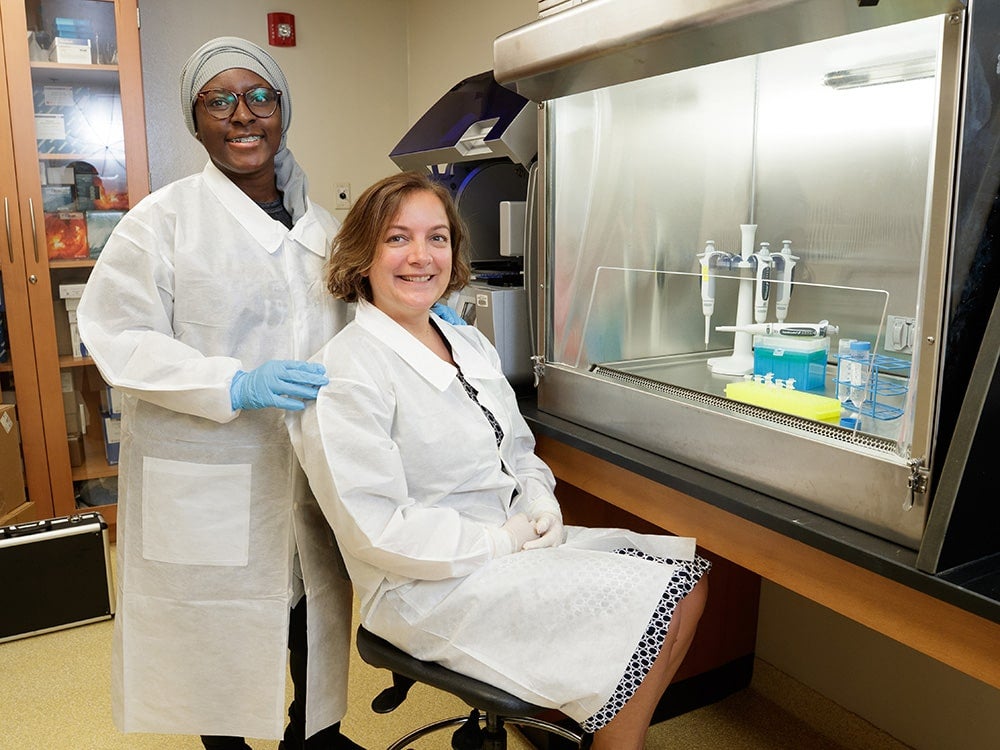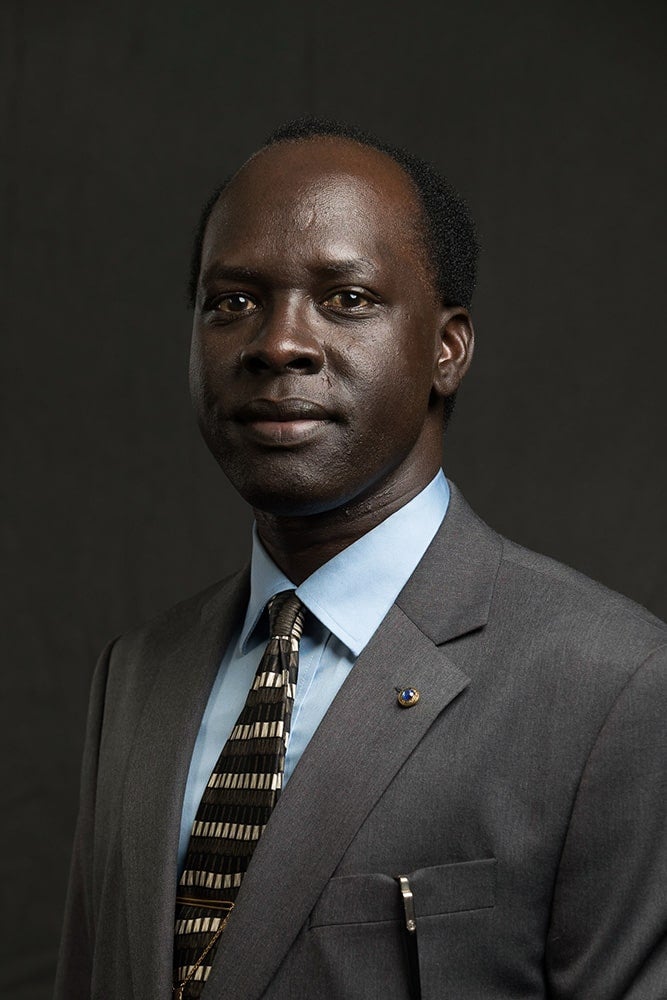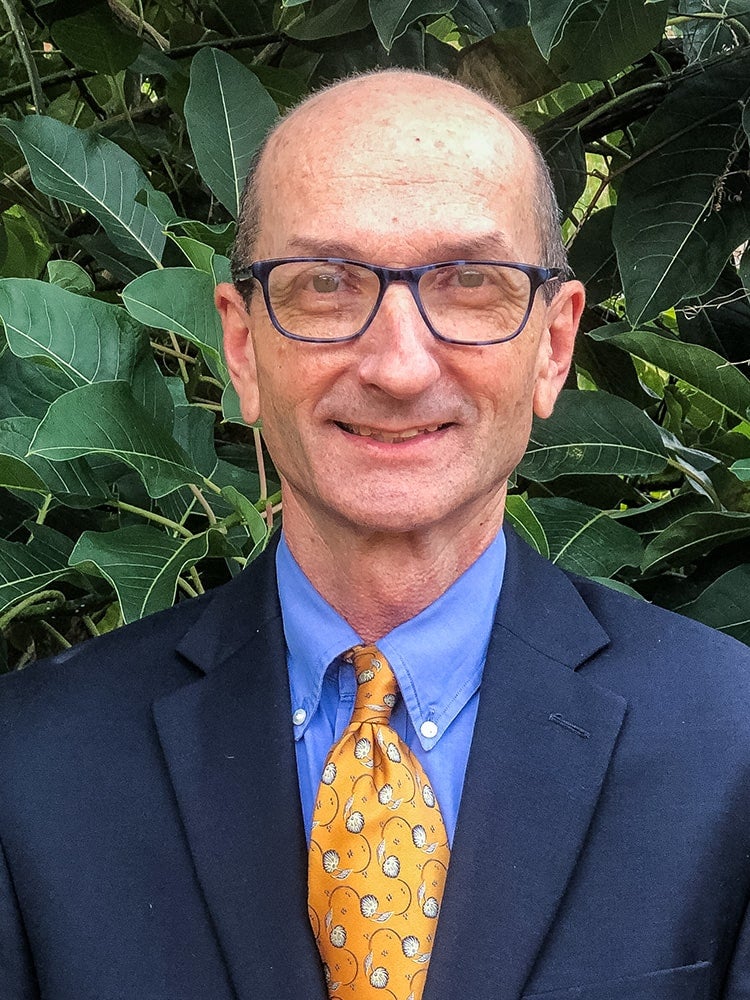Ready to make the world a healthier place? Georgia Southern University’s Doctor of Public Health (DrPH) program helps you advance to a new level of leadership in research, health care, policy development, biostatistics, community health or epidemiology. Focus your expertise in one of five strategic areas.
Locations
- Statesboro Campus (In Person)
- Online
Why Earn a DrPH at Georgia Southern?
- Full-time and part-time program options.
- Choose from multiple face-to-face concentrations or the fully online Public Health Leadership concentration.
- Affordable tuition.
- Flexible curriculum with five career-specific concentrations and multiple electives.
- 60-69 credit hours to completion.
How do health systems improve access to care? What are the underlying causes of diseases or injuries at the population level? How can policy and data directly address health disparities, and what is the best approach for engaging the surrounding community?
To date, you’ve studied sources and examined intersecting factors, using your findings to influence policy, create outreach programming, analyze public health, health care or biomedical data, or rethink health services delivery. As you contemplate your next steps forward, Georgia Southern’s DrPH program positions you to confidently move up in the public health field and focus your core skills.
Whether you’re a full-time student or an employed public health professional, our doctoral program imparts the knowledge, skills and values you need to serve with effectiveness.
Choosing from one of five concentrations, you’ll hone your expertise in an area that matches your career path. An immersive field placement and culminating dissertation give you a combination of hands-on experience and scholarly depth that equips you for a variety of roles in government, the health care industry, biomedical and clinical research, nonprofits and education.
With flexible study options and a supportive environment, you can complete your degree in three to four years to access enhanced opportunities, grow your influence and gain the qualifications for directing teams, projects, studies and campaigns.
Ready to Apply?
What Can You Do With a Doctor of Public Health?
Tailor your training and future to a particular career path through the DrPH’s five concentrations. You might take a research focus, empowering better health outcomes through data as a biostatistician, policy analyst or epidemiologist. Or, lead program implementation in health administration, policy development or education.
Where our graduates work:
- Centers for Disease Control and Prevention
- Food and Drug Administration
- Hospitals
- National Cancer Institute
- Pharmaceutical companies
- Universities
What our graduates do:
- Biostatistician
- College professor
- Epidemiologist
- Health care administrator
- Health policy analyst
- Health services manager
- Public health director
What You’ll Learn
Core courses strengthen your research skills, deepen your understanding of the scientific basis of public health and increase your awareness of the ethical principles that guide the profession. For your elective requirement, a concentration lets you align your training and expertise with your interests and goals.
For a real-world perspective, a 300-hour field placement in a public health setting both tests and refines your growing knowledge. Finally, the DrPH program culminates in an integrated learning experience, during which you’ll demonstrate your ability to synthesize and apply theory at the highest level.
See the CurriculumConcentrations
Specialize your public health training through one of five program concentration areas available on our Statesboro campus or online:
Biostatistics
Prepare to function as an advanced biostatistician in public health and biomedical-related fields. You’ll be able to develop and apply statistical reasoning and methods to address, analyze and solve problems in public health, health care, biomedical, clinical and population-based research.
Community Health Behavior and Education
A solid grounding in social and behavioral sciences theory equips you to lead community and public health programs, conduct community-based participatory programs, seek funding through grant writing, and develop and disseminate research-based findings.
Epidemiology
Gain the needed skills to become an applied epidemiologist in the public health field. Pursuing a career in a government agency, private organization or academia, you’ll serve the community, region, state and nation by analyzing population-wide health problems affecting rural and urban environments.
Health Policy
Integrate and apply expertise in leadership, practice, policy analysis, program and budget management and communication. This focus helps you assess multiple perspectives on contemporary health problems and provide direction within a variety of public health-related organizations.
Public Health Leadership
In this online concentration, you’ll leverage public health-specific leadership training experiences to become adept at complex problem solving, analyzing community health needs and developing goal-based policies and programs that efficiently utilize available resources.
Build Your Experience
Establish yourself as an innovator through challenging, hands-on experiences that let you apply your growing understanding in real-world contexts.

Doctoral Preceptorship in Public Health
Integrate and extend your knowledge through a 300-hour field experience, where you’ll work with a faculty member and expert practitioner in your area of focus.

Integrated Learning Experience/Dissertation
Address an ongoing public health concern through a substantial written product aligned with your career path, like an article for publication, a grant proposal or a case analysis.
Want to Learn More?
Explore essential information about our M.Ed. in Counselor Education program, including application details, accreditation status, and licensing disclosures. Gain insight into the program’s credibility and requirements to help you start your journey toward success with the knowledge you need.
Admission into the graduate programs within the Jiann-Ping Hsu College of Public Health (JPHCOPH) is competitive. Decisions are based on the applicant’s demonstrated ability to excel at graduate work and alignment of the applicant’s research/career goals with faculty interests and abilities.
Deadline
Applications for the JPHCOPH graduate programs are accepted for Fall admission only.
February 1 — Final Deadline for all DrPH applicants.
Application Timeline
Please refer to the timeline in the SOPHAS Quick Start Guide.
- SOPHAS Timeline – To ensure your application is forwarded (sent) to JPHCOPH on time, all materials should be received by SOPHAS at least four (4) weeks prior to the JPHCOPH application deadline date. Once your application is considered complete, it can take up to four (4) weeks to be processed and verified by SOPHAS.
- Georgia Southern University Timeline – The DrPH Admissions committee will begin reviewing all applications immediately after the admissions deadline. Applicants passing an initial review will be notified to schedule a virtual or in-person interview. After all interviews have been completed, decisions will be made and promptly communicated to applicants.
- Waitlist – Applicants may be placed on a waitlist to be considered for admission later in the admissions review cycle. In this case, the applicant will be notified by email and offered the opportunity to remain on the waitlist or to be removed from the applicant pool. Waitlist candidates will receive information regarding their updated status on or before May 1.
Application Support
For technical support questions such as how to submit supporting documents, please visit the SOPHAS Applicant Help Center.
For more information on the DrPH program, please reach out to JPHCOPH Admissions.
Regular Admission
- Application – Completion of an application in Schools of Public Health Application Service (SOPHAS).
- Degree – Completion of a master’s or terminal degree** from a regionally accredited institution. Applicants who do not have a graduate degree in public health will be required to complete prerequisite public health coursework*.
- Transcripts – Official transcript(s) from each college or university previously attended. A transcript is required even if the courses from one school appear on the transcript of another school. SOPHAS will not process your application without receiving all official transcripts. Please refer to the SOPHAS Applicant Help Center for instructions on Sending Official Transcripts to SOPHAS.
- All foreign transcripts must be evaluated by World Education Services (WES). Visit World Education Services: International Credential Evaluation to view which documents are required for your country and to request an International Credential Advantage Package (ICAP) Course-by-Course Report.
- Transcript(s) should show completion of at least one (1) graduate-level core course in each of the following five (5) areas: biostatistics, epidemiology, social and behavioral sciences in public health, health policy and management and environmental health. (Applicants may be asked to provide syllabi for courses taken.)
- Courses must have been completed in the last five (5) years and each must have been passed with a grade of “B” or better. Applicants who have not completed these courses but whose applications show exceptional potential for success in the DrPH program may be admitted but will be required to complete the courses (as presented in the JPHCOPH MPH core course requirements) with grades of “B” or better before progressing to the Public Health Core and Concentration Courses of the DrPH program. If the applicant has completed a master’s degree in a field other than public health, professional public health work experience in one or more of the five core areas may be substituted for the corresponding MPH-level courses at the discretion of the College. Applicants who took these courses more than five years ago but who work in the public health field may request a waiver. Requests for this waiver must be submitted in writing to jphcoph-admissions@georgiasouthern.edu.
- Grade Point Average (GPA) – Preferred minimum cumulative GPA of 3.0/4.0 scale in graduate courses. Competitive candidates will have a graduate GPA of 3.5 or higher.
- Quantitative/Analytic Experience and Ability – Provide a concise statement detailing your previous quantitative/analytic experience, such as courses completed (whether for credit), quantitative/analytic work completed for research and publications in which you meaningfully took part, standardized test scores and/or work experience. Please use this statement to detail what you have accomplished and, if applicable, how you have used your abilities outside of the classroom. In addition, provide examples of the experience/ability included in your statement.
- English Language Proficiency – International applicants and U.S. citizens whose native language is not English must demonstrate English proficiency. Prior to consideration for admission, international applicants whose native language is not English must take and post acceptable scores on the Test of English as a Foreign Language (TOEFL) or the International English Language Testing System (IELTS), unless they have received a degree from an accredited college or university in the United States, the United Kingdom, Canada (except Quebec), Australia or New Zealand. The TOEFL and IELTS examinations are administered at various times of the year and in many centers throughout the world.
- A score of at least 75 (internet-based test, IBT) or 537 (paper-based test) on the TOEFL and 6.0 on the IELTS is normally required to be considered for regular admission. The official TOEFL and the official IELTS scores may not be more than two (2) years old. Those who do not meet the minimum proficiency standard may be recommended for enrollment in University English courses or for English courses offered by the English Language Program (ELP) on campus. Successful completion of Intensive English Programs (IEPs) at other English Language Program (ELP) providers will be considered on a case-by-case basis.
- Letters of Recommendation – Three (3) letters of recommendation. It is strongly advised that two letters be from individuals who can address your past academic performance, and it is encouraged that the third letter be from a work or internship supervisor.
- Curriculum Vitae/Résumé – A CV/résumé that includes the following: a) educational experiences, b) professional goals and objectives, c) work history, d) professional experiences, memberships and/or participation in professional organizations, and e) experiences in public health programs. For the Public Health Leadership concentration, a minimum of three (3) years of experience in public health, health care or a closely related area are required. Work experience is not required for applicants to the Biostatistics, Community Health Behavior and Education, Epidemiology, or Health Policy and Management concentrations.
- Statement of Purpose – A Statement of Purpose (700-1,000 words) that conveys the applicant’s reasons for pursuing a DrPH and how admission into the program relates to the applicant’s professional aspirations.
- Interview – Applicants demonstrating potential for success in the DrPH program may be required to participate in an in-person or telephone interview prior to a final decision by the admissions committee.
*Some students may be required to take prerequisite coursework prior to beginning the program of study. Conditions of admission will be presented at the student’s first advisement appointment.
** Acceptable terminal degrees include M.D., J.D., DrPH or Ph.D.
Other Important Links
- JPHCOPH Graduate Application FAQs
- Application Deadlines
- DrPH Graduation Requirements
- Doctorate Non-Degree Requirements
- DrPH Competencies and Outcomes
- Plans of Study
- Disclosures
Contact Information
jphcoph-admissions@georgiasouthern.edu
912-478-2674
See Full Admission Information Apply NowAt Georgia Southern, enjoy the flexibility of fully online courses that fit within your busy schedule, allowing you to study while you continue to work and earn. Online instructors weave interactive experiences into each course, ensuring you engage at a deeper level.
Plus, you’ll have access to an academic and technical support team, so you’re never on your own.
About Our Online ProgramsFor All Online Programs
Federal law requires colleges and universities to make certain disclosures to prospective students of these programs. These disclosures include information on the University’s authority to operate outside of Georgia, complaint processes, adverse actions, and refunds.
For required disclosures in general with regard to online programs offered by the University, visit the Office of Legal Affairs website.
The Doctor of Public Health program is accredited by the Council on Education for Public Health.
Alumni Feature
Fired by childhood experiences as a refugee of war, DrPH graduate and public health researcher Abraham Deng Ater co-founded United Vision for Change, a private foundation dedicated to building schools and health clinics in rural Sudan.
Read Abraham's Story
Faculty Spotlight
As the director of the Center for Public Health Practice & Research, Professor Charles Owens draws on his extensive experience, including leading state-level programs in rural health, to connect academic research with on-the-ground applications at local, state and national levels.
Learn More
Related Programs

Take the Next Step
You’re committed to improving public health. So grow your impact, knowledge and effectiveness with advanced training in Georgia Southern’s DrPH program.
Contact the Jiann-Ping Hsu College of Public Health
Armstrong Campus
Solms Hall, Suite 109
11935 Abercorn Street
Savannah, GA 31419
912-478-2674
Statesboro Campus
Hendricks Hall
501 Forest Dr.
Statesboro, GA 30458
912-478-2674
Email: Graduate Advisor


